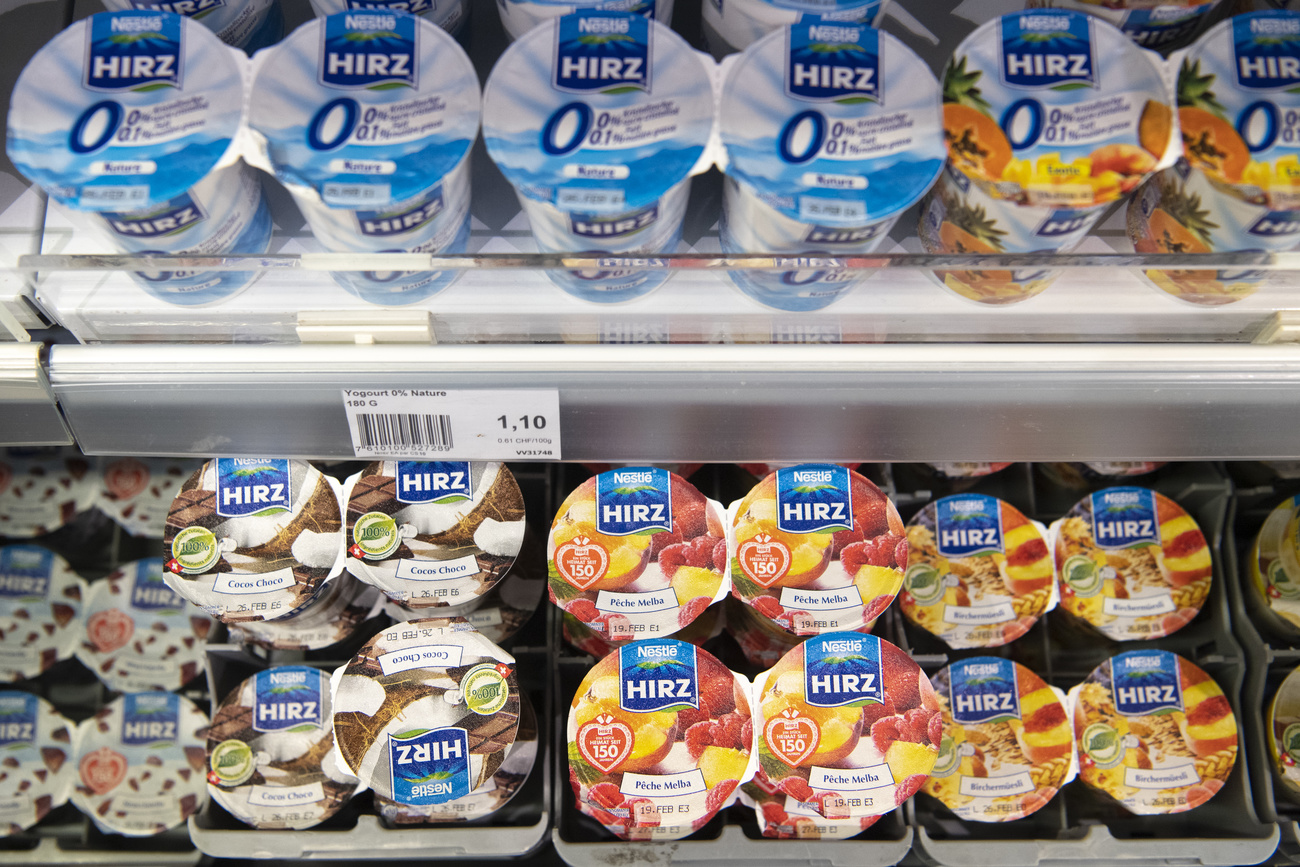Why Switzerland’s sugar addiction is unlikely to change

High sugar consumption in Switzerland is a serious public health problem, contributing to obesity, diabetes and other chronic diseases. But lawmakers are hesitant to act.
Sweets, chocolate, soft drinks: the Swiss population has a real passion for anything containing sugar. In Swiss households, sugar consumption is among the highest in EuropeExternal link, and more than double the 50 grams per person per day recommended by the World Health Organization (WHO).
Already in 2015, the WHO had sounded the alarm about excessive sugar intake and the rise of obesity and chronic diseases such as diabetes, cardiovascular disease and cancer. In Switzerland, where at least 40% of the adult population is overweight, four out of five people die from these diseases. The associated healthcare costs are estimated at more than External linkCHF50 billion ($58 billion) per year, or 80% of total healthcare costs.
Several countries such as France, Belgium and the United Kingdom have taken action to reduce the amount of sugar in food and beverages, through measures such as sugar taxes, clearer labels and bans on advertising aimed at young people.
Switzerland has not introduced any of these measures, despite appeals from health organisations. “If we don’t want to become like the United States, where 50% of the population is obese and/or has diabetes, we have to act as soon as possible,” says Virginie Mansuy-Aubert, a researcher and expert on the interaction between diet and healthy gut flora at the University of Lausanne.
But politicians are reluctant to put the brakes on the food industry, which is worth billions of francs and includes Nestlé, headquartered not far from Lausanne.
We need sugar – in moderation
Sugars themselves are essential for the proper functioning of our bodies. One of the most important sugars for energy production is glucose, which is produced during the digestion of carbohydrates found in foods such as pasta, cereals, fruit and vegetables. Several studies have shown that glucose played a key role in the evolution of the human brain.
Through the digestive system, glucose enters the bloodstream and, thanks to the action of a hormone called insulin, makes its way into the various cells of the human body, “feeding”
The problems start when sugar doses are excessive. Since the mid-19th century, sugar consumption in Switzerland has increased from around eight grams to 110 grams per person per day.
“This huge increase is worrying,” says Léonie Chinet, general secretary of Diabète Vaud, the association for people with diabetes in the western Swiss canton of Vaud.
When people eat too much sugar, the excess glucose turns into body fat, leading to obesity. High glucose levels can also cause tissue and cell damage, inflammation and chronic diseases over time. The global increase in obesity and associated diseases is of great concern to Swiss health and consumer organisations, which are actively campaigning for sugar consumption awareness. In May, Diabète Vaud launched a public campaign, the “MAYbe less sugarExternal link” challenge, to help people become aware of their actual sugar consumption.
Those who signed up for the initiative were able to calculate the amount of added sugar they consumed daily using a calculator available on the campaign website. Chinet is very satisfied with the result: almost 7,000 people took part, far more than expected. But data gathered through the initiative shows that only a small fraction of participants were from population groups most affected by excessive sugar consumption, such as young people or those from disadvantaged social groups.
“It’s difficult to involve these people in prevention campaigns. That is why structural measures are needed,” she says.
Added sugar hides in many foods
“Sugar is hidden everywhere,” Mansuy-Aubert says. At an event for the “MAYbe less sugar” campaign, she helped a group of teenagers calculate their sugar consumption.
The young men and women were surprised to discover that although they did not drink fizzy drinks or eat sweets, their sugar intake levels were very high. “The problem is that all the processed foods we eat contain sugar, but we often don’t know it,” Mansuy-Aubert says.
Refined sugars and syrups are added to foods such as ham, lasagne, pizza and processed cheese to increase their palatability. “The result is that we want to eat these foods again and in larger quantities without really knowing why,” she explains.
Added sugars are probably metabolised differently from fruit or raw food sugars, for example, because they are not linked to other nutrients such as fibre, which helps to counteract a fast rise in blood sugar. Blood sugar spikes caused by added sugar increase the risk of developing diabetes.
When pleasure leads to addiction
But these glycaemic peaks also give us a sense of immediate reward. Eating sugar stimulates sweet receptors in the mouth and glucose receptors in the gut, via neural pathways that connect them to the brain. This triggers the production of dopamine, a neurotransmitter that makes us feel rewarded and influences our desire to eat more.
“Sugar has the effect of activating the reward circuitry in the brain. In this sense, it acts like a drug,” says neuroscientist Serge Ahmed of the University of Bordeaux. Since 2007, Ahmed has been studying the psychological mechanisms involved in sugar addiction and their similarity to those caused by drugs.
In a studyExternal link, he showed that when rats consume sugar water, dopamine is released much faster than through intravenously injected cocaine, thus making it more rewarding.
This research indicates that sugar-rich diets intensely stimulate the nervous system, generating a supernormal reward signal and leading to addiction. Ahmed believes the causes lie in evolution: mammals such as rats and humans evolved in sugar-poor environments and thus would not have adapted to high sugar concentrations.
“This creates a big public health problem,” he says.
Sugar regulation is unlikely
To combat that problem, countries such as the UK, France and Mexico have adopted measures such as a tax on drinks and foods containing added sugar. The positive impact of this has been widely documented. In Switzerland, parliament recently rejected a similar proposal. The Alpine country is instead promoting non-binding measures, such as the Milan Declaration. Companies that sign this document voluntarily commit to reducing the sugar content in their breakfast products or beverages, but no law holds them to it.
According to Manuela Weichelt, parliamentarian for the Green Party and president of the Diet and Health Alliance, the multi-billion-dollar agri-food industries – many of which are headquartered in Switzerland – are lobbying to keep sugar off the agenda of Swiss legislators.
The efforts extend beyond Swiss borders. An investigationExternal link by the NGO Public Eye alleged that in 2019, the Swiss State Secretariat for Economic Affairs (SECO) intervened on behalf of Nestlé in Mexico to obstruct the introduction of warning labels on unhealthy foods. Asked about the matter, SECO replied by email that it was not acting in the interests of any company, but that it was acting in accordance with the principles of the World Trade Organization (WTO)External link, which protects member countries from measures that could penalise trade in their goods.
In Switzerland, political support for sugar goes even further, says Patrick Dümmler, researcher at the liberal thinktank Avenir Suisse. Switzerland encourages and subsidises beet cultivation for indigenous sugar production.
“It’s schizophrenic to cultivate and refine sugar beets with public money on the one hand and at the same time finance campaigns to reduce sugar consumption,” Dümmler says. He thinks agreements by sector targeting a voluntary reduction would be more effective than a sugar tax.
Given the many interests involved, Weichelt doesn’t expect stricter laws on sugar to pass anytime soon. According to her, “sugar is untouchable in Switzerland”.
Edited by Sabrina Weiss and Veronica DeVore

In compliance with the JTI standards
More: SWI swissinfo.ch certified by the Journalism Trust Initiative













You can find an overview of ongoing debates with our journalists here . Please join us!
If you want to start a conversation about a topic raised in this article or want to report factual errors, email us at english@swissinfo.ch.